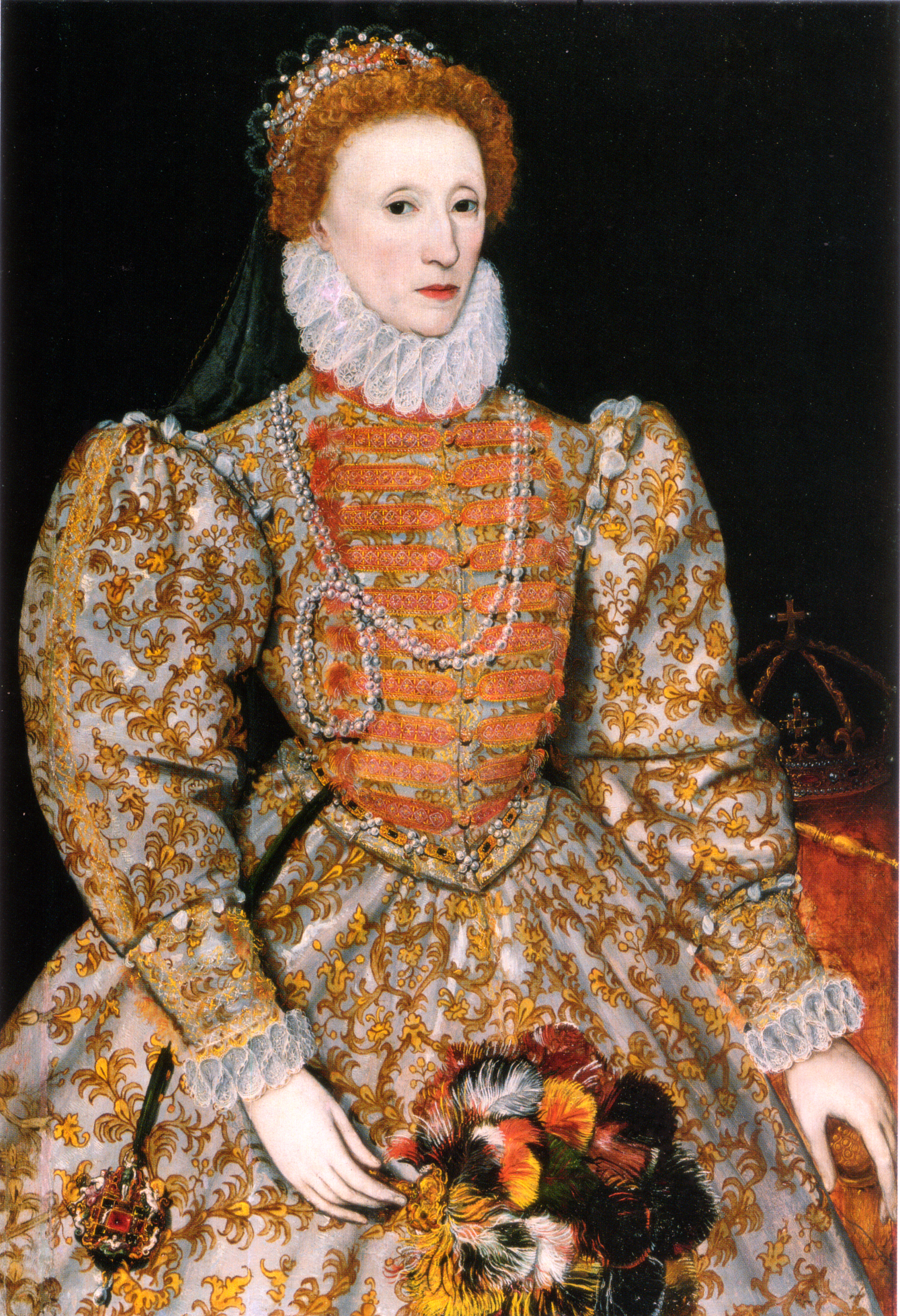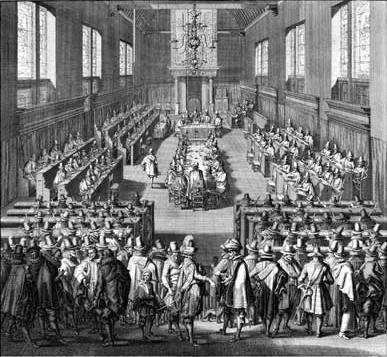|
Laudian
Laudianism, also called Old High Churchmanship, or Orthodox Anglicanism as they styled themselves when debating the Tractarians, was an early seventeenth-century reform movement within the Church of England that tried to avoid the extremes of Roman Catholicism and Puritanism by building on the work of Richard Hooker, and John Jewel and was promulgated by Archbishop William Laud and his supporters. It rejected the predestination upheld by Calvinism in favour of free will, and hence the possibility of salvation for all men through objective work of the sacraments. Laudianism had a significant impact on the Anglican high church movement and its emphasis on the sacraments, personal holiness, beautiful liturgy, and the episcopate. Laudianism was the culmination of the move to Arminianism in the Church of England, and led directly to the Caroline Divines, of which Laud was one of the first. The expression of this since the Oxford movement is often called Central churchmanship. Th ... [...More Info...] [...Related Items...] OR: [Wikipedia] [Google] [Baidu] |
Arminianism In The Church Of England
Arminianism is a theological position within the Church of England particularly evident in the second quarter of the 17th century (the reign of Charles I of England). A key element was the rejection of predestination. The Puritans fought against Arminianism, and King James I of England opposed it before, during, and after the Synod of Dort, 1618–1619, where the English delegates participated in formulating the Calvinist Canons of Dort, but his son Charles I, favoured it, leading to deep political battles. The Methodists, who espoused a variant of the school of thought called Wesleyan–Arminian theology, branched off the Church of England in the 18th century. Characteristics The term "Arminianism" in Protestant theology refers to Jacobus Arminius, a Dutch theologian, and his Remonstrant followers, and covers his proposed revisions to Reformed theology (known as Calvinism). "Arminianism" in the English sense, however, had a broader application: to questions of church hier ... [...More Info...] [...Related Items...] OR: [Wikipedia] [Google] [Baidu] |
William Laud
William Laud (; 7 October 1573 – 10 January 1645) was a bishop in the Church of England. Appointed Archbishop of Canterbury by Charles I of England, Charles I in 1633, Laud was a key advocate of Caroline era#Religion, Charles I's religious reforms; he was arrested by Parliament of England, Parliament in 1640 and executed towards the end of the First English Civil War in January 1645. Laud believed in Episcopal polity, episcopalianism, or rule by bishops. "Laudianism" was a reform movement that emphasised liturgical ceremony and clerical hierarchy, enforcing uniformity within the Church of England, as outlined by Charles. Its often Ritualism in the Church of England, highly ritualistic aspects prefigure what are now known as high church views. In theology, Laud was accused of Anglican Arminianism, Arminianism, favouring doctrines of the historic church prior to the Reformation and defending the continuity of the English Church with the primitive and medieval church, and opposi ... [...More Info...] [...Related Items...] OR: [Wikipedia] [Google] [Baidu] |
Central Churchmanship
Central churchmanship describes those who adhere to a middle way in the Anglican Communion of the Christian religion and other Anglican church bodies, being neither Anglo-Catholic nor low church in their doctrinal views and liturgical preferences. The term is used much less frequently than some others as Anglicanism polarized into Anglo-Catholic and Evangelical/ Reformed wings. In ''The Claims of the Church of England'', Cyril Garbett, Archbishop of York, used the term along with Anglo-Catholic, liberal, and evangelical as a label for schools within the Church of England, but also states:Within the Anglican Church are Anglo-Catholics, Evangelicals, Liberals and the great mass of English Churchmen who are content to describe themselves as Churchmen without any further label. History The term came into use in the late nineteenth century when traditional high churchmen decided to distance themselves from Anglo-Catholicism that came out of the Oxford Movement. With the Oxfor ... [...More Info...] [...Related Items...] OR: [Wikipedia] [Google] [Baidu] |
High Church
A ''high church'' is a Christian Church whose beliefs and practices of Christian ecclesiology, Christian liturgy, liturgy, and Christian theology, theology emphasize "ritual, priestly authority, [and] sacraments," and a standard liturgy. Although used in connection with various Christian denominations, Christian traditions such as High Church Lutheranism, ''high church'' Lutheranism, the English term ''high church'' originated in the Anglican tradition, where it described a churchmanship in which a number of Ritualism, ritual practices associated in the popular mind with Roman Catholicism were used, or as a description of such practices in the Catholic Church and elsewhere. The opposite tradition is ''low church''. Contemporary media discussing Anglican churches often prefer the terms Evangelical Anglicanism, evangelical to ''low church'' and Anglo-Catholic to ''high church'', even though their meanings do not exactly correspond. Other Christian denominations that contain ''high ch ... [...More Info...] [...Related Items...] OR: [Wikipedia] [Google] [Baidu] |
Elizabethan Settlement
The Elizabethan Religious Settlement is the name given to the religious and political arrangements made for England during the reign of Elizabeth I (1558–1603). The settlement, implemented from 1559 to 1563, marked the end of the English Reformation. It permanently shaped the Church of England's doctrine and liturgy, laying the foundation for the unique identity of Anglicanism. When Elizabeth inherited the throne, England was bitterly divided between Catholics and Protestants as a result of various religious changes initiated by Henry VIII, Edward VI and Mary I. Henry VIII had broken from the Catholic Church and the authority of the Pope, becoming the supreme head of the Church of England. During Edward's reign, the Church of England adopted a Reformed theology and liturgy. In Mary's reign, these religious policies were reversed, England was re-united with the Catholic Church and Protestantism was suppressed. The Elizabethan Settlement was an attempt to end this religious t ... [...More Info...] [...Related Items...] OR: [Wikipedia] [Google] [Baidu] |
Council Of Trent
The Council of Trent (), held between 1545 and 1563 in Trent (or Trento), now in northern Italy, was the 19th ecumenical council of the Catholic Church. Prompted by the Protestant Reformation at the time, it has been described as the "most impressive embodiment of the ideals of the Counter-Reformation.""Trent, Council of" in Cross, F. L. (ed.) ''The Oxford Dictionary of the Christian Church'', Oxford University Press, 2005 (). It was the last time an ecumenical council was organized outside the city of Rome. The Council issued key statements and clarifications of the Church's doctrine and teachings, including scripture, the biblical canon, sacred tradition, original sin, justification, salvation, the sacraments, the Mass, and the veneration of saintsWetterau, Bruce. ''World History''. New York: Henry Holt and Company, 1994. and also issued condemnations of what it defined to be heresies committed by proponents of Protestantism. The consequences of the council were als ... [...More Info...] [...Related Items...] OR: [Wikipedia] [Google] [Baidu] |
Perseverance Of The Saints
Perseverance of the saints, also known as preservation of the saints, is a Calvinist doctrine asserting that the elect will persevere in faith and ultimately achieve salvation. This concept was initially developed by Augustine of Hippo in the early 5th century, based on the idea of predestination by predeterminism. In the 16th century, John Calvin and other reformers integrated this idea into their theological framework. The doctrine of perseverance of the saints is rooted in this understanding of predestination and continues to be a central tenet of Reformed theology today. Definition and terminology Definition The doctrine of perseverance of the saints asserts that the elect will persevere in faith until the end of their lives and ultimately achieve salvation. Those who are truly born again are the elect who will persevere to the end. Terminology The alternative term "preservation of the saints" emphasizes God's role in determining the elect's perseverance. Conversely, ... [...More Info...] [...Related Items...] OR: [Wikipedia] [Google] [Baidu] |
Unconditional Election
Unconditional election (also called sovereign election or unconditional grace) is a Calvinist doctrine relating to predestination that describes the actions and motives of God prior to his creation of the world, when he predestined some people to receive salvation, the elect, and the rest he left to continue in their sins and receive the just punishment, eternal damnation, for their transgressions of God's law as outlined in the Old and New Testaments of the Bible. God made these choices according to his own purposes apart from any conditions or qualities related to those persons. The counter-view to unconditional election is the Arminian view of conditional election, the belief that God chooses for eternal salvation those whom he foreknows will exercise their free will to respond to God's prevenient grace with faith in Christ. God's election was for a clear unalterable purpose, to elect those who will believe. Summary In Calvinist theology, unconditional election is conside ... [...More Info...] [...Related Items...] OR: [Wikipedia] [Google] [Baidu] |
Eucharist
The Eucharist ( ; from , ), also called Holy Communion, the Blessed Sacrament or the Lord's Supper, is a Christianity, Christian Rite (Christianity), rite, considered a sacrament in most churches and an Ordinance (Christianity), ordinance in others. Christians believe that the rite was instituted by Jesus at the Last Supper, the night before Crucifixion of Jesus, his crucifixion, giving his Disciple (Christianity), disciples bread and wine. Passages in the New Testament state that he commanded them to "do this in memory of me" while referring to the bread as "my body" and the cup of wine as "the blood of my covenant, which is poured out for many". According to the synoptic Gospels, this was at a Passover meal. The elements of the Eucharist, sacramental bread, either Leavening agent, leavened or Unleavened bread, unleavened, and sacramental wine (non-alcoholic grape juice in some Protestantism, Protestant traditions, such as Methodism), are consecrated on an altar or a communio ... [...More Info...] [...Related Items...] OR: [Wikipedia] [Google] [Baidu] |
Apostasy In Christianity
Apostasy in Christianity is the abandonment or renunciation of Christianity by someone who formerly was a Christian. The term apostasy comes from the Greek word ''apostasia'' (" ἀποστασία") meaning "rebellion", "state of apostasy", "abandonment", or "defection". It has been described as "a willful falling away from, or rebellion against, Christianity. Apostasy is the rejection of Christ by one who has been a Christian. …" "Apostasy is a theological category describing those who have voluntarily and consciously abandoned their faith in the God of the covenant, who manifests himself most completely in Jesus Christ." "Apostasy is the antonym of conversion; it is deconversion."Paul W. Barnett, ''Dictionary of the Later New Testament and its Developments,'' "Apostasy," 73. B. J. Oropeza, who has written one of the most exhaustive studies on the phenomenon of apostasy in the New Testament (3 Volumes, 793 pages), "uncovered several factors that result in apostasy."Oropeza, ... [...More Info...] [...Related Items...] OR: [Wikipedia] [Google] [Baidu] |
Conditional Preservation Of The Saints
The conditional preservation of the saints, or conditional perseverance of the saints, or commonly conditional security, is the Arminian Christian belief that believers are kept safe by God in their saving relationship with him upon the ''condition'' of a persevering faith in Christ. Arminians find the Scriptures describing both the initial act of faith in Christ, "whereby the relationship is effected", and the persevering faith in him "whereby the relationship is sustained." The relationship of "the believer to Christ is never a static relationship existing as the irrevocable consequence of a past decision, act, or experience." Rather, it is a living union "proceeding upon a living faith in a living Savior." This living union is captured in the simple command by Christ, "Remain in me, and I in you" (). According to Arminians, biblical saving faith expresses itself in love and obedience to God ( Galatians 5:6; Hebrews 5:8–9). In the ''Remonstrant Confession'' of 1621, the first ... [...More Info...] [...Related Items...] OR: [Wikipedia] [Google] [Baidu] |








